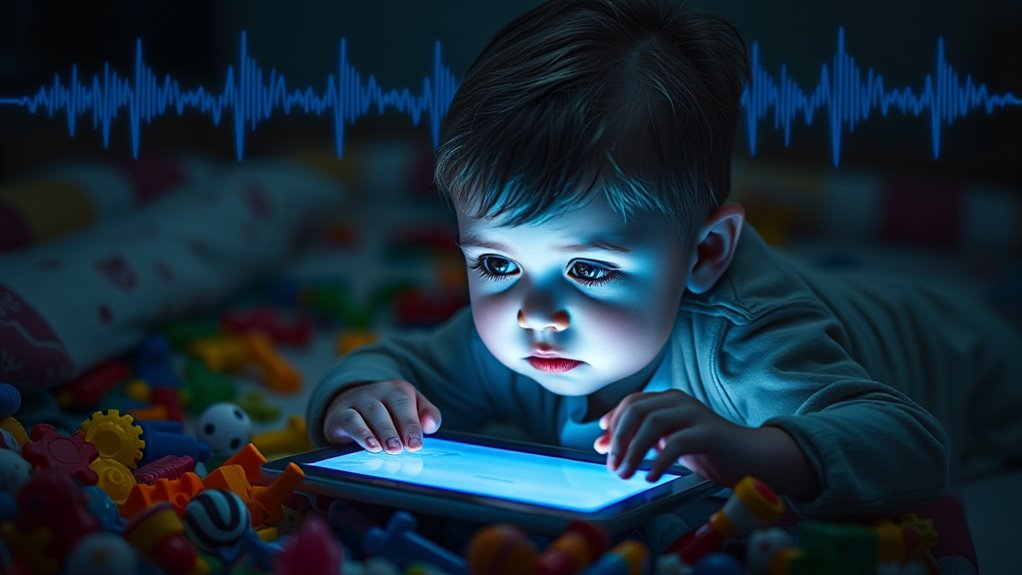Shocking Facts About Screen Time and Your Child’s Brain!
Excessive screen time can seriously affect your child’s brain development. On average, kids aged 6 to 18 spend over 7 hours a day in front of screens. This can lead to decreased attention spans, affecting critical thinking and problem-solving skills. Additionally, constant exposure to fast-paced content can hinder imaginative play and reduce empathy due to less face-to-face interaction. You might notice increased anxiety linked to social media too. Balancing screen time with offline activities is crucial for cognitive and emotional growth. There’s so much more to discover about fostering healthy tech habits for your child.
Key Takeaways
- Children aged 2 to 5 average 3 hours of daily screen time, impacting cognitive and emotional growth negatively.
- Prolonged screen exposure can lead to cognitive decline, diminishing problem-solving and critical thinking abilities.
- Excessive screen time is linked to increased anxiety and reduced empathy due to limited face-to-face interactions.
- Attention spans may decrease with constant access to fast-paced content, hindering focus on sustained tasks.
- Limiting recreational screen time and encouraging alternative activities can significantly promote healthier cognitive and emotional development.
Screen Time Statistics
In today’s digital age, your child’s screen time can feel like an overwhelming topic to tackle. Recent statistics reveal that children aged 2 to 5 spend an average of about 3 hours daily on screens, while those aged 6 to 18 can easily exceed 7 hours. These numbers can raise alarms, especially when considering the implications for brain development.
Research shows that excessive screen time can interfere with the crucial stages of cognitive and emotional growth. Your child’s brain is still developing, and exposure to screens can limit their engagement in essential offline activities, such as physical play and face-to-face interactions.
Moreover, the type of content consumed plays a pivotal role. Educational programs can be beneficial, but mindless scrolling or passive viewing can hinder critical thinking skills. As a parent, it’s vital to create a balanced media diet that prioritizes quality over quantity.
Effects on Cognitive Development
Excessive screen time can significantly impact your child’s cognitive development. Research shows that prolonged exposure to screens can lead to cognitive decline, particularly in areas like problem-solving and critical thinking. As screens dominate your child’s environment, their ability to engage in imaginative play and hands-on learning diminishes, which are crucial for developing these skills.
Moreover, you may notice a decrease in your child’s attention span. With constant access to fast-paced content, their brains can adapt to expecting quick rewards, making it harder for them to focus on tasks that require sustained concentration. This shift can hinder their academic performance and overall learning experience.
It’s essential to balance screen time with activities that promote cognitive growth, such as reading, playing outside, or engaging in social interactions. By doing so, you can help your child develop essential skills and maintain a healthy attention span. Recognizing the importance of this balance is crucial in fostering a well-rounded cognitive development journey for your child. Take the time to assess their screen habits and make necessary adjustments to enhance their learning and growth potential.
Emotional Impacts of Excessive Use
Screen time can take a toll on your child’s emotional well-being, leading to feelings of isolation and anxiety. When your child spends too much time in front of screens, it can disrupt their ability to develop essential skills like emotional regulation and meaningful social interactions.
Consider these emotional impacts:
- Increased Anxiety: Constant exposure to social media can create unrealistic expectations and fear of missing out, elevating anxiety levels.
- Reduced Empathy: Excessive screen time may limit face-to-face interactions, which are crucial for understanding others’ emotions, ultimately diminishing your child’s empathy.
- Difficulty in Emotional Regulation: Children may struggle to manage their emotions effectively, as they rely on screens for entertainment and distraction rather than engaging in real-world problem-solving.
These emotional challenges can manifest as behavioral issues, withdrawal from family activities, or even depression. It’s essential to recognize these signs early on. By fostering healthier habits around screen time, you can help your child build resilience and enhance their emotional intelligence, paving the way for a more balanced and fulfilling life.
Guidelines for Healthy Usage
To support your child’s development while managing screen time, establishing clear guidelines is crucial. Start by following the latest screen time recommendations, which suggest limiting recreational screen time to about one hour per day for children aged 2 to 5, and encouraging consistent boundaries for older kids. This helps create a foundation for digital balance in their lives.
It’s essential to engage with your child during their screen time. Choose high-quality, educational content together and discuss what they watch. This interaction not only enriches their learning experience but also strengthens your bond. Encourage breaks; applying the 20-20-20 rule—every 20 minutes, have them look at something 20 feet away for 20 seconds—can alleviate eye strain.
Moreover, set aside specific times for screen use, such as during weekends or after homework, to cultivate a sense of routine. Model healthy behaviors yourself; children often mirror their parents’ habits. Lastly, create tech-free zones, like the dining table, to ensure family time remains uninterrupted. By implementing these guidelines, you’re not just managing screen time; you’re fostering an environment where your child can thrive both online and offline.
Alternatives to Screen Time
Finding engaging alternatives to screen time can significantly benefit your child’s development and well-being. By fostering a variety of activities, you can stimulate their creativity, improve social skills, and encourage physical activity. Here are three effective alternatives:
-
Outdoor Activities: Encourage your child to explore nature through hiking, biking, or playing in the park. These activities not only promote physical health but also enhance their appreciation for the environment.
-
Creative Play: Provide materials for art projects, building blocks, or role-playing games. Creative play allows your child to express themselves and develop problem-solving skills in a fun, engaging manner.
-
Reading Together: Foster a love for literature by reading books together. This not only strengthens their vocabulary and comprehension but also creates an opportunity for discussion and bonding.
Frequently Asked Questions
How Does Screen Time Affect Sleep Patterns in Children?
Imagine your child’s mind as a garden. Too much screen time can stunt their sleep quality, making it harder for them to bloom. Reducing screen exposure before bed helps nurture restful nights and vibrant days.
Can Screen Time Lead to Behavioral Issues in Children?
Screen time can influence behavioral issues in children by altering their attention spans and emotional responses. You should monitor usage, as excessive exposure might lead to irritability and difficulty in managing social interactions effectively.
What Age Is Considered Too Young for Screen Exposure?
In today’s digital age, understanding when to limit screen exposure is crucial. For children under two, it’s often considered too early, as excessive screen time can interfere with developmental milestones and hinder cognitive effects.
Are There Specific Types of Screens That Are More Harmful?
When considering screen types, video games can lead to addictive behaviors and social media often fosters anxiety and comparison. It’s crucial to monitor your child’s engagement with these platforms to mitigate potential harm.
How Can Parents Monitor Their Child’s Screen Time Effectively?
When it comes to monitoring your child’s screen time, staying on the ball is essential. Use screen time guidelines alongside parental controls to ensure balance, encouraging healthy habits while keeping an eye on their usage.




